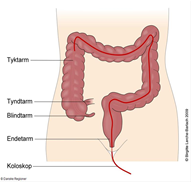A colonoscopy is a visual examination of the rectum and colon to determine the presence of abnormalities in these regions and it is performed using a colonoscope. A colonoscope is a flexible tube about the size of a finger. It is fitted with a camera and connected to a TV screen. The specialist can guide the colonoscope through the rectum and colon with a view to determining the presence of abnormalities in the mucous membranes. Using a small pincers inserted through the colonoscope, the physician can take samples from the mucous membrane and remove polyps. This is painless.
Preparation
Before a colonoscopy, there are a few things that you need to be aware of.
- You may not take iron supplements for 3 days before the examination.
- If you are taking anticoagulants, it is sometimes necessary to pause it before the examination. Please ask the physician for advice. You may continue to take any other prescribed medication as usual.
- A colonoscopy is often performed using a sedative. Sedatives make you unable to drive a car for the rest of the day. We therefore recommend that you arrange for someone to accompany you on your journey home after the examination.
Bowel cleansing instructions prior to colonoscopy
To ensure the successful performance and results of the examination, it is imperative that the bowel is emptied completely before the examination. Thorough bowel cleansing is therefore required.
The day before the examination
At 1 PM: You may eat a light lunch. After lunch, you may only ingest a liquid diet until after the examination.
At 7 PM: For dinner, drink at least 1 glass of ‘clear liquid’. Clear liquid includes water, cordial, fizzy drinks, clear broth, juice without fruit pulp and coffee/tea without milk.
First dose: In close proximity to your dinner, drink 1 sachet of PicoPrep® dissolved in a large glass of water (150ml). Then drink a further ¼ liter of liquid. You are welcome to drink as much clear liquid as you like.
During the rest of the evening, you must drink at least 3 glasses of clear liquid before going to bed.
On the day of the examination
At 8 AM: As breakfast, drink at least one glass of clear fluid.
Second dose: In close proximity to the breakfast, drink 1 sachet of PicoPrep® dissolved in a large glass of water (150ml). Then drink a further ¼ liter of liquid. You are welcome to drink additional clear liquid until the time of the examination.
It is important to stay hydrated and drink lots of fluid during the bowel cleanse.
The examination
You will lie on your left side during the examination. The colonoscope is inserted into the rectum and up into the colon. The full length of the colon will be examined. A puff of air is pumped into the colon to ensure that the folds are open and that the physician can examine the colon walls systematically. You may find this causes discomfort and bloating. The physician will release some of the air at the end of the examination and the discomfort will dissipate. The examination takes approximately 45 minutes.
To minimize discomfort, a combination of analgesic and sedative can be administered at the beginning of the examination.
After the examination
You may eat and drink normally after the examination.
If you have been given a sedative, you may not drive a car for the rest of the day.
If a biopsy was taken, the results will be available within 1-2 weeks.
Potential side-effects and complications
A colonoscopy is a very safe examination, which very rarely causes complications. Taking samples from the mucous membrane may result in small amounts of blood in the stool within the first 24 hours.
In extremely rare cases after removal of a polyp, severe bleeding or colon perforation may occur. In that case, contact the clinic or the nearest emergency room immediately.

